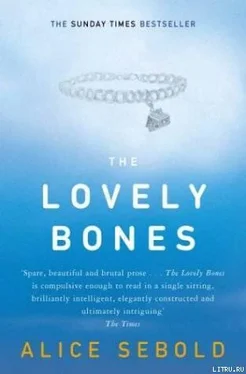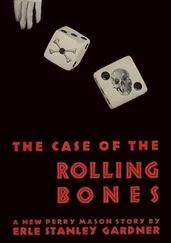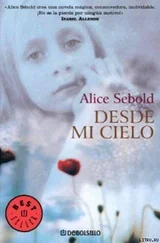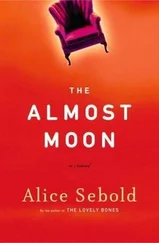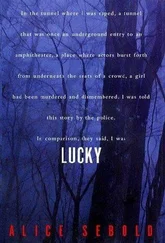“Over here!” he said, and the other officers ran to surround him.
The neighbors had gone home except for Mrs. Stead. After conferring around the discovering policeman, Detective Fenerman broke their dark huddle and approached her.
“Mrs. Stead?” he said over the tape that separated them.
“Yes.”
“You have a child in the school?”
“Yes.”
“Could you come with me, please?”
A young officer led Mrs. Stead under the police tape and over the bumpy, churned-up cornfield to where the rest of the men stood.
“Mrs. Stead,” Len Fenerman said, “does this look familiar?” He held up a paperback copy of To Kill a Mockingbird . “Do they read this at the school?”
“Yes,” she said, her face draining of color as she said the small word.
“Do you mind if I ask you…” he began.
“Ninth grade,” she said, looking into Len Fenerman’s slate blue eyes. “Susie’s grade.” She was a therapist and relied on her ability to hear bad news and discuss rationally the difficult details of her patients’ lives, but she found herself leaning into the young policeman who had led her over. I could feel her wishing that she had gone home when the other neighbors had left, wishing that she was in the living room with her husband, or out in the backyard with her son.
“Who teaches the class?”
“Mrs. Dewitt,” Mrs. Stead said. “The kids find it a real relief after Othello .”
“ Othello ?”
“Yes,” she said, her knowledge of the school suddenly very important right now – all the policemen listening. “Mrs. Dewitt likes to modulate her reading list, and she does a big push right before Christmas with Shakespeare. Then she passes out Harper Lee as a reward. If Susie was carrying around To Kill a Mockingbird it means she must have turned in her paper on Othello already.”
All of this checked out.
The police made calls. I watched the circle widen. Mrs. Dewitt had my paper. Eventually, she sent it back to my parents, unmarked, through the mail. “Thought you would want to have this,” Mrs. Dewitt had written on a note attached to it. “I’m so very very sorry.” Lindsey inherited the paper because it was too painful for my mother to read. “The Ostracized: One Man Alone,” I had called it. Lindsey had suggested “The Ostracized,” and I made up the other half. My sister punched three holes down the side of it and fastened each carefully handwritten page into an empty notebook. She put it in her closet under her Barbie case and the box that held her perfect-condition Raggedy Ann and Andy that I’d envied.
Detective Fenerman called my parents. They had found a schoolbook, they believed, that might have been given to me that last day.
“But it could be anyone’s,” my father said to my mother as they began another restless vigil. “Or she could have dropped it along the way.”
Evidence was mounting, but they refused to believe.
Two days later, on December twelfth, the police found my notes from Mr. Botte’s class. Animals had carried off the notebook from its original burial site – the dirt did not match the surrounding samples, but the graph paper, with its scribbled theories that I could never understand but still dutifully recorded, had been found when a cat knocked down a crow’s nest. Shreds of the paper were laced among the leaves and twigs. The police unbraided the graph paper, along with strips of another kind of paper, thinner and brittle, that had no lines.
The girl who lived in the house where the tree stood recognized some of the handwriting. It was not my writing, but the writing of the boy who had a crush on me: Ray Singh. On his mother’s special rice paper Ray had written me a love note, which I never read. He had tucked it into my notebook during our Wednesday lab. His hand was distinct. When the officers came they had to piece together the scraps of my biology notebook and of Ray Singh’s love note.
“Ray is not feeling well,” his mother said when a detective called his house and asked to speak to him. But they found out what they needed from her. Ray nodded to her as she repeated the policeman’s questions to her son. Yes, he had written Susie Salmon a love note. Yes, he had put it in her notebook after Mr. Botte had asked her to collect the pop quiz. Yes, he had called himself the Moor.
Ray Singh became the first suspect.
“That sweet boy?” my mother said to my father.
“Ray Singh is nice,” my sister said in a monotone at dinner that night.
I watched my family and knew they knew. It was not Ray Singh.
The police descended on his house, leaning heavily on him, insinuating things. They were fueled by the guilt they read into Ray’s dark skin, by the rage they felt at his manner, and by his beautiful yet too exotic and unavailable mother. But Ray had an alibi. A whole host of nations could be called to testify on his behalf. His father, who taught postcolonial history at Penn, had urged his son to represent the teenage experience at a lecture he gave at the International House on the day I died.
At first Ray’s absence from school had been seen as evidence of his guilt, but once the police were presented with a list of forty-five attendees who had seen Ray speak at “Suburbia: The American Experience,” they had to concede his innocence. The police stood outside the Singh house and snapped small twigs from the hedges. It would have been so easy, so magical, their answer literally falling out of the sky from a tree. But rumors spread and, in school, what little headway Ray had made socially was reversed. He began to go home immediately after school.
All this made me crazy. Watching but not being able to steer the police toward the green house so close to my parents, where Mr. Harvey sat carving finials for a gothic dollhouse he was building. He watched the news and scanned the papers, but he wore his own innocence like a comfortable old coat. There had been a riot inside him and now there was calm.
I tried to take solace in Holiday, our dog. I missed him in a way I hadn’t yet let myself miss my mother and father, my sister and brother. That way of missing would mean that I had accepted that I would never be with them again; it might sound silly but I didn’t believe it, would not believe it. Holiday stayed with Lindsey at night, stood by my father each time he answered the door to a new unknown. Gladly partook of any clandestine eating on the part of my mother. Let Buckley pull his tail and ears inside the house of locked doors.
There was too much blood in the earth.
On December fifteenth, among the knocks on the door that signaled to my family that they must numb themselves further before opening their house to strangers – the kind but awkward neighbors, the bumbling but cruel reporters – came the one that made my father finally believe.
It was Len Fenerman, who had been so kind to him, and a uniform.
They came inside, by now familiar enough with the house to know that my mother preferred them to come in and say what they had to say in the living room so that my sister and brother would not overhear.
“We’ve found a personal item that we believe to be Susie’s,” Len said. Len was careful. I could see him calculating his words. He made sure to specify so that my parents would be relieved of their first thought – that the police had found my body, that I was, for certain, dead.
“What?” my mother said impatiently. She crossed her arms and braced for another inconsequential detail in which others invested meaning. She was a wall. Notebooks and novels were nothing to her. Her daughter might survive without an arm. A lot of blood was a lot of blood. It was not a body. Jack had said it and she believed: Nothing is ever certain.
Читать дальше
